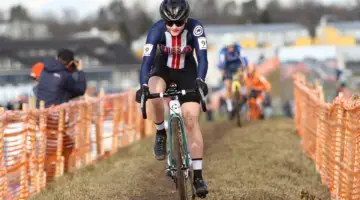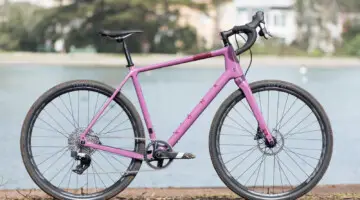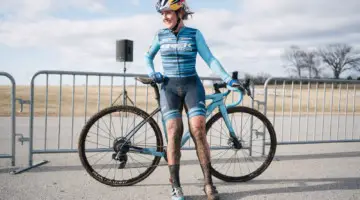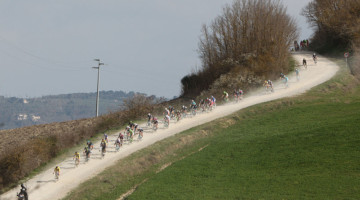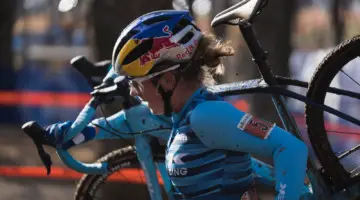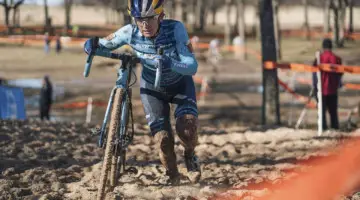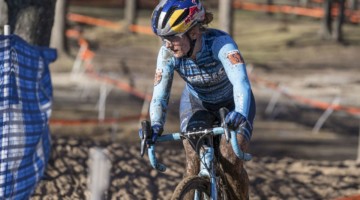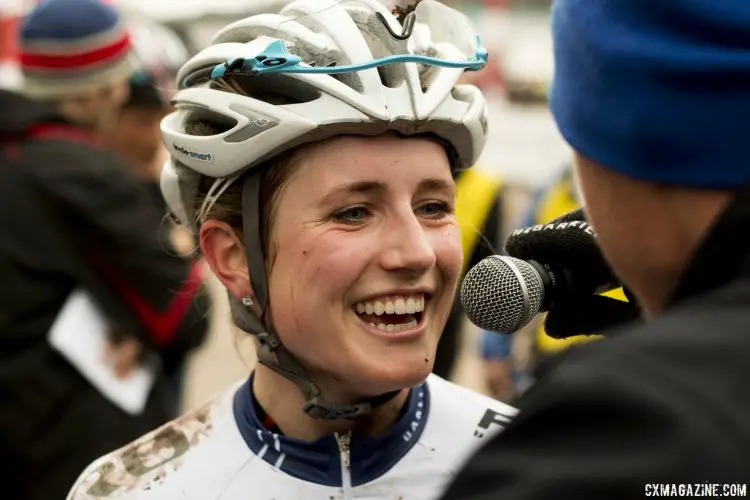
Ellen Noble wants to take aim for the Youth Women’s World Championship in 2016, and while she likes the progress being made, she acknowledges that more needs to be done. © Cyclocross Magazine
Last January, the UCI announced the introduction of a new category for Youth Women in the Cyclocross World Championship. In Issue 28, Cindy Brennan examined what the top of that field might look like, and interviewed a few notable athletes on their impressions of the steps that the UCI are making towards equality in cyclocross. For extensive columns like this one, be sure to order your backcopy today, which is also available on Uberflip, in the App Store on iTunes, and on Google Play for Android.
by Cindy Brennan
In a move widely lauded by the cycling community, the UCI announced plans to introduce a Youth Women’s category at the 2016 Cyclocross World Championships in Heusden-Zolder. Women ages 17-22 will be eligible for the new category, which is effectively a combined Junior and U23 race. The Youth Women’s race in 2016 will be the first of its kind at the highest tier of competition, although both the Pan-American and European Continental Cyclocross Championships have recently begun to hold U23 Women’s races.
This historic addition of a new category marks another step forward in cycling’s long march toward equality for women. Women were only offered the chance to compete on the global stage of cyclocross at the 2000 World Championships, hosted in the Dutch town Sint-Michielsgestel, which was a full 50 years after the Men’s World Championships began in the discipline.
At the Continental level, the women’s cyclocross community is already honored with large participation and fierce competition. Last year, Maghalie Rochette of the Luna Chix Pro Team took the U23 Pan-American Continental Championship, while Sabrina Stultiens of Rabobank-Liv Giant earned the European Continental Championship. This year, both will have a racing age of 23, rendering them ineligible to defend their titles or compete in the new World Championship category. In their wake, however, they will be leaving big fields of highly competitive young athletes, ready to make their mark on history by being the first to earn the rainbow stripes in this category.
This field is brand new, so competition is wide open for the crown. Contenders will certainly include Jessica Lambracht, the current Elite Women’s champion of Germany; Alice Maria Arzuffi, an Italian racer who has multiple UCI Elite wins and took 14th place in the Elite field at Tabor; Nadja Heigl, who had a compelling surprise ride in Tabor for a top-20 placement; Laura Verdonschot, a young Belgian with plenty of top tens against some of the hardest fields in the World, and Amira Mellor, young British rising star who placed fourth at her National Championship. Ellen Noble, who took a first place victory in the U23 race in Austin, will be an American favorite.
On the recent news, Ellen Noble takes the long view, noting the ripples this single change could create in women’s cyclocross for years to come. “The longer people are involved, and higher the level of skill, the higher the overall level of racing is. When the level of racing takes a step up, more money gets invested, which will then keep racers around because there is actually a future in it. It’s a cascading effect, and only good things can come out of it.”
Helen Wyman, nine-time British National Cyclocross Champion, two-time European Cyclocross Champion, and member of the UCI Cyclocross Commission, was instrumental to the inclusion of the new category for 2016. Being a racer herself, she also recognizes that the race could cause a shift to occur among the young female racers who, like her, often focus on their education before starting their racing careers. Noble, currently a college student, discussed the tough choices a youth women’s category will force her to make: “I don’t know what I will do next year for school. I know that if I want to continue developing, and going to Europe, consequently missing school is inevitable.”
But continued progress could also mean more women could eke out a career in racing. “Prize money and start money are increasing, there are teams that pay women well. It’s more and more a viable career,” Wyman said.
This is, without a doubt, progress; however, everyone would agree the Commission’s work carving out a fair space for women is nowhere near done. “I don’t want to ignore that adding a youth category is an amazing step forward. I think this addition will really transform the women’s side of cyclocross,” Noble said. “It’s okay to be happy with progress while understanding that there is still progress to be made.”
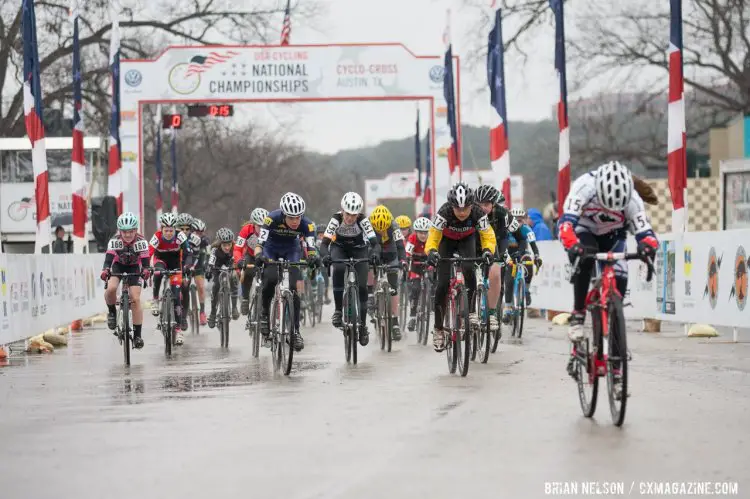
Will the future of cyclocross offer an incentive for more young women to participate at the highest level? © Brian Nelson
Truly, there is so much progress still to be made, and Wyman is certain to play a crucial role in the next steps along the way toward equality. A successful Youth Women’s race at the World Championships will encourage the category’s inclusion in World Cup races, a step Wyman is pushing for. Also up for debate at the next meeting of the Commission will be how to offer equal pay to women at the World Cup races. “Everybody agrees it should be equal,” explained Wyman. “The question will be how to get it there.”
In addition to equal payouts and more races for youth women, Wyman plans to advocate for more media coverage, especially television coverage, of women’s races, highlighting the crucial importance of showcasing the sport to promoting its growth. “This sport is thrilling. It’s really mega. The Elite Women’s race at the World Championships in Tabor was the most exciting ’cross race I have seen in years. Every time Pauline Ferrand-Prévot jumps a barrier, it’s so exciting for women’s cyclocross, and there are fewer excuses for why we should get less coverage,” Wyman said.
While the new Youth Women’s category is truly a tremendous development for the sport, some feel more needs to be done before celebrating. Many, sensing the pressing importance of the progress still sitting on the agenda, feel impatient, even frustrated. “Women’s cyclocross is young, really, compared to men’s racing. The sport is still trying to find its feet,” said Wyman. “The women have come a long way in a short time, however,” she continued, “and now is the time to match that change with equal treatment. At the highest level of the UCI, a decision was made to focus on women in the sport, and that has provided each commission with a window for change. Initially, we made good progress on the ’cross commission: the Youth category, race times, equalized C2 prize money. However, on the biggest issues there seems to be a lack of drive for progress. I am frustrated when asked for ‘time and patience’—it’s purely an excuse to slow down change.”
Wyman continues: “I do believe we need change. There’s no harm in cycling being equal.” This new category for women in the World Championships in Zolder is only a single step on the long road towards equality. It’s a step in the right direction, creating increased opportunities and exposure for women’s cycling. However, for some, it is too small a step with too slow a stride.


